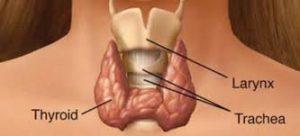Thyroid Program
 Master Endocrine Regulator! The thyroid gland is a small, butterfly-shaped gland located at the base of your neck, just below your Adam’s apple. The thyroid produces hormones, which not only have an enormous impact on your health but also affect all aspects of your metabolism – from the rate at which your heart beats to how quickly you burn calories.
Master Endocrine Regulator! The thyroid gland is a small, butterfly-shaped gland located at the base of your neck, just below your Adam’s apple. The thyroid produces hormones, which not only have an enormous impact on your health but also affect all aspects of your metabolism – from the rate at which your heart beats to how quickly you burn calories.
It is an important organ that regulates your entire body's metabolism. The thyroid gland secretes two main thyroid hormones – thyroxine (T4) and triiodothyronine (T3). The secretion of T3 and T4 by the thyroid gland is controlled by a feedback mechanism involving the pituitary gland, a small organ at the base of the brain, and the hypothalamus, a structure in the brain. The rate at which thyroxine and triiodothyronine are released is controlled by your pituitary gland and your hypothalamus – an area at the base of your brain that acts as a thermostat for your whole system.
 The hypothalamus signals your pituitary gland to make a hormone called thyroid-stimulating hormone (TSH). Your pituitary gland then releases TSH – the amount depends on how much thyroxine and triiodothyronine are in the blood. If you don’t have enough thyroxine or triiodothyronine in your blood, your TSH blood level will be above normal; if you have too much, your TSH level will fall below normal. Finally, your thyroid gland regulates its production of hormones based on the amount of TSH it receives. As long as your thyroid releases the proper amounts of these hormones, your system functions normally. Yet, in today’s fast-living world filled with an onslaught of environmental toxins, as well as a diet lacking the most vital nutrients, a staggering number of 60-70% of the population U.S. are affected with an under-functioning thyroid gland, and most of which are women, as well as presenting over-functioning thyroid ailments.
The hypothalamus signals your pituitary gland to make a hormone called thyroid-stimulating hormone (TSH). Your pituitary gland then releases TSH – the amount depends on how much thyroxine and triiodothyronine are in the blood. If you don’t have enough thyroxine or triiodothyronine in your blood, your TSH blood level will be above normal; if you have too much, your TSH level will fall below normal. Finally, your thyroid gland regulates its production of hormones based on the amount of TSH it receives. As long as your thyroid releases the proper amounts of these hormones, your system functions normally. Yet, in today’s fast-living world filled with an onslaught of environmental toxins, as well as a diet lacking the most vital nutrients, a staggering number of 60-70% of the population U.S. are affected with an under-functioning thyroid gland, and most of which are women, as well as presenting over-functioning thyroid ailments.

Your thyroid gland might produce the right amount of hormones, yet they might have difficulty getting through the inflamed cell membranes, heavily polluted by environmental toxicity and metabolic waste. Then we talk about thyroid resistance. Another cause may be linked to the thyroid gland itself, which is polluted by toxins like heavy metals. Another possibility could be an inflamed thyroid gland, which then causes excess thyroid hormones, stored in the gland, to leak into the bloodstream. A weak and sluggish liver can also add to a depleted thyroid function. Most of all, the digestive system contributes a huge part to the interrelationship and communication with the thyroid gland. If you suffer from Leaky Gut Syndrome (and most of us do), your thyroid will be directly affected.
Today, the scientific community acknowledges that iodine deficiency causes one of the main reasons for a malfunctioning thyroid. The removal of iodine from bread and the use of bromine instead inhibit thyroid hormone production. Fluoride in municipal water affects the thyroid gland too. Other reasons might be X-rays, mammograms, dental procedures excessive electromagnetic exposure to lack of antioxidant nutrients. Stress is a major factor as it causes the release of adrenal stress hormones that suppress thyroid function and encourage thyroxin resistance.
Can Thyroid Disease Affect My Mood?
 Yes, thyroid disease can affect your mood – primarily causing either anxiety or depression.
Yes, thyroid disease can affect your mood – primarily causing either anxiety or depression.
Generally, the more severe the thyroid disease, the more severe the mood changes. If you have an overactive thyroid (hyperthyroidism), you may experience unusual nervousness, restlessness, anxiety, and irritability.
On the opposite end of the spectrum, if you have an underactive thyroid (hypothyroidism), you may experience mild to severe fatigue and depression. Thyroid disease is usually associated with signs and symptoms such as weight gain or loss, sensitivity to hot or cold, bowel movement changes, and menstrual irregularities.
MEDICA NOVA offers the THYROID PROGRAM, which addresses all mentioned causes and irregularities in one comprehensive program.
The THYROID PROGRAM can be purchased with a free phone consultation.
For further information and prices contact Medica Nova at health@medicanova.net
The products themselves are not intended for, and are not offered as a cure, palliative, or ameliorator for any disease or ailment; but are intended solely for nutritional and dietary purposes.

